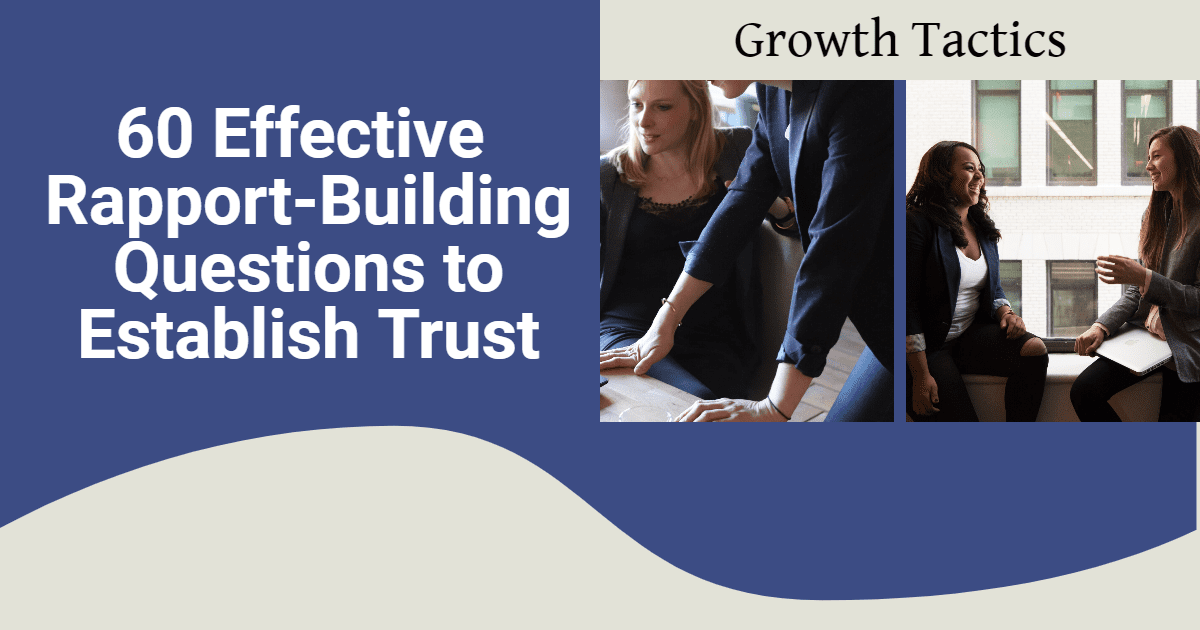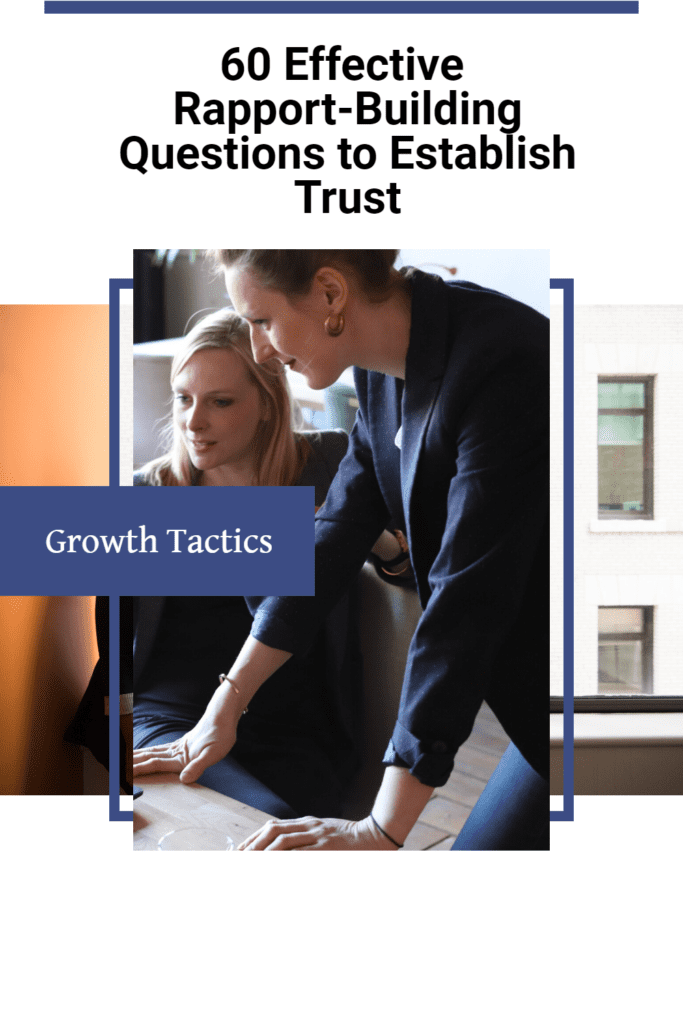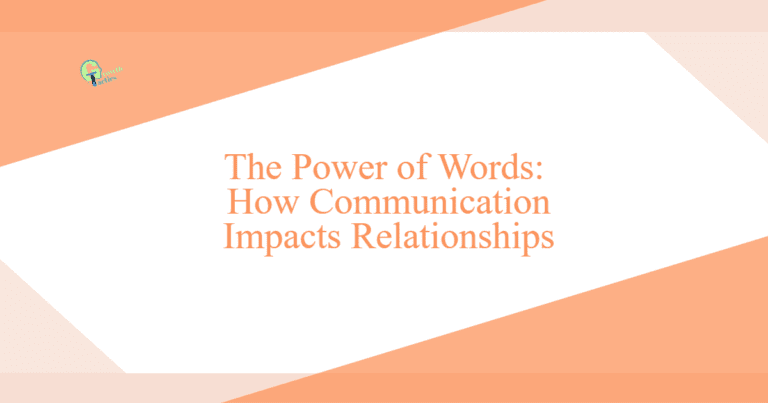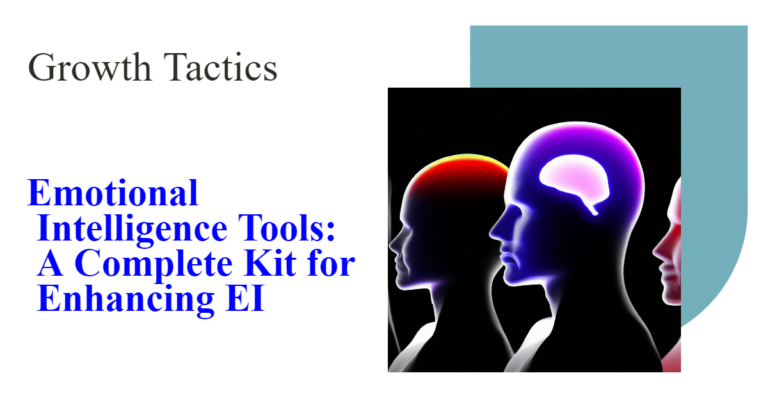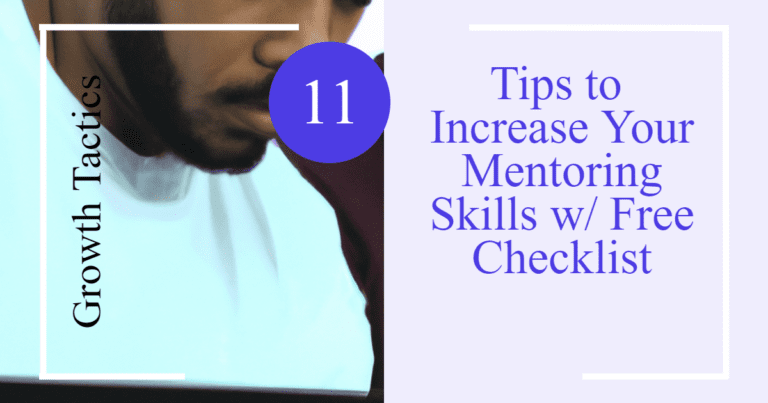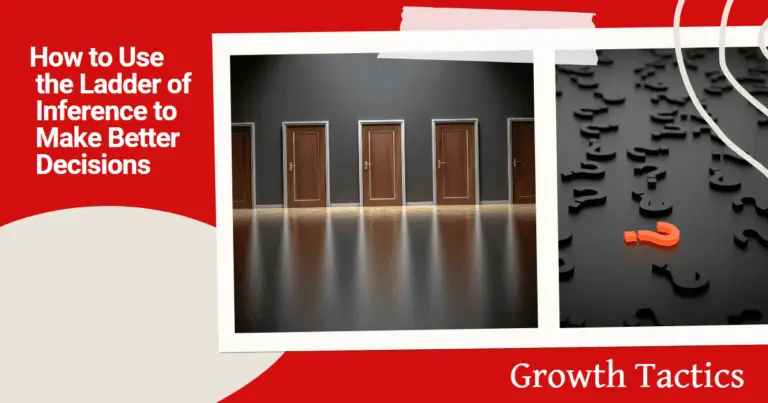Rapport-building is an essential skill in any personal or professional relationship. It is the key to establishing trust, fostering connection, and creating a positive environment. Whether you are in sales, management, or simply looking to improve your interpersonal skills, asking the right questions can help you build rapport quickly and effectively. In this article, we will explore the benefits of building rapport, provide tips for building rapport at work, and share examples of effective rapport-building questions.
Jump To Section
Why is Rapport Building Important?
Before we dive into the specific questions, let’s understand why building rapport is crucial. Building rapport creates a foundation of trust, which is essential for any successful relationship. When you establish rapport with someone, they are more likely to open up, share information, and feel comfortable in your presence. This is especially important in sales, where building rapport can make or break a deal.
By asking the right rapport-building questions, you can show genuine interest in your customers or prospects, which in turn helps build trust. It allows you to go beyond the surface level and establish a deeper connection, leading to stronger relationships and better outcomes.
The Benefits of Building Rapport

Enhanced Communication
When we build rapport, communication becomes more effective and meaningful. By establishing a level of trust and understanding, individuals feel more comfortable expressing their thoughts, ideas, and concerns. This open and honest communication fosters better collaboration, problem-solving, and teamwork, leading to improved outcomes and stronger relationships.
Increased Empathy
Rapport allows for a greater sense of empathy towards others. As we establish connections and actively listen to others’ perspectives, we gain a deeper understanding of their needs, emotions, and experiences. This empathy enables us to provide support, offer assistance, and build stronger bonds based on mutual care and understanding.
Strengthened Trust
Building rapport helps create an environment of trust and reliability. When individuals feel heard and understood, their trust in one another grows. This trust forms the foundation for effective teamwork, productive partnerships, and successful collaborations. Trust also fosters a safe space for taking risks, sharing vulnerabilities, and seeking guidance, ultimately leading to personal and professional growth.
Improved Conflict Resolution
When rapport is established, conflicts and disagreements can be resolved more effectively. Individuals with a strong rapport can engage in constructive dialogue, actively listen to differing opinions, and find mutually beneficial solutions. This collaborative approach to conflict resolution not only strengthens relationships but also enhances personal and professional growth through learning from diverse perspectives.
Tips for Building Rapport

Active Listening
Active listening is a fundamental skill for building rapport. When engaging in a conversation, focus your attention on the speaker and be fully present. Avoid interrupting or formulating responses in your mind while they’re speaking. Instead, listen actively and genuinely to what they’re saying. Ask clarifying questions and summarize their points to ensure understanding and show that you value their perspective.
Find Common Ground
Finding common ground is a powerful way to establish rapport quickly. Look for shared interests, experiences, or beliefs that you can connect on. It could be as simple as discussing a hobby, a favorite book, or a recent event. By highlighting these commonalities, you create a sense of connection and understanding, which helps build trust and fosters further conversation.
Show Empathy
Demonstrating empathy is a key aspect of building rapport. Put yourself in the other person’s shoes and try to understand their feelings and experiences. Show that you genuinely care about their emotions and challenges. Avoid judgment or dismissive responses. Instead, offer support and validation by acknowledging their perspective and expressing empathy towards their situation.
Be Authentic and Genuine
Authenticity is vital when building rapport. Be yourself and avoid pretending to be someone you’re not. People can sense when someone is being insincere. Instead, embrace your true self and show genuine interest in getting to know others. This openness creates a safe and trustworthy environment, fostering deeper connections and meaningful relationships.
Pay Attention to Non-Verbal Communication
Non-verbal communication plays a significant role in building rapport. Pay attention to your body language, facial expressions, and tone of voice. Maintain an open and relaxed posture, make eye contact, and use friendly and welcoming expressions. Similarly, observe the non-verbal cues of the other person. Show that you’re attentive and responsive to their signals, which helps establish a positive and comfortable atmosphere.
Follow-Up and Stay Connected
Building rapport is an ongoing process. After an initial conversation, follow up with the person to maintain the connection. It could be a quick message, a shared article, or an invitation to meet again. By staying engaged and connected, you show continued interest and reinforce the rapport you’ve built.
Examples of Effective Rapport-Building Questions to Ask
Building rapport is crucial in any communication, as it establishes a connection and fosters trust between individuals. Asking the right questions can help create a meaningful conversation and build strong relationships. Here are some examples of effective rapport-building questions:
Personal Questions
When getting to know someone on a personal level, asking questions about their interests and hobbies can help create a friendly and comfortable atmosphere. Here are a few examples:
- What do you enjoy doing outside of work?
- Do you have any exciting plans for the weekend?
- Have you been on any interesting vacations lately?
- What hobbies or interests do you have?
- Are there any books, movies, or TV shows you would recommend?
- How did you become interested in your current hobbies or interests?
- What’s the best concert or live event you’ve ever attended?
- What’s your favorite sport to watch or play?
- What are some of your favorite local attractions or hidden gems?
- Do you have any collections or other unique interests?
- What’s the most adventurous thing you’ve ever done?
- Do you have any life goals or aspirations that you’re currently working towards?
- What’s something you’ve always wanted to learn or try?
- Do you have a favorite quote or mantra that inspires you?
- What’s the most meaningful gift you’ve ever received?
Work-Related Questions
To understand someone’s professional aspirations and experiences, it’s beneficial to ask work-related questions. Here are a few examples:
- What do you find most rewarding about your work?
- How did you get started in your career?
- Can you share a recent accomplishment or success at work?
- Are there any projects or initiatives you’re currently working on?
- What challenges or obstacles have you encountered in your role?
- What motivates you to succeed in your job?
- Do you have any long-term career aspirations or goals?
- How do you approach collaboration with others in the workplace?
- What’s the best piece of career advice you’ve ever received?
- How do you handle conflicts or difficult conversations with coworkers or superiors?
- Are there any particular skill sets you think are important for success in your job?
- What’s your preferred method of communication in the workplace?
- Can you share a time when you had to make a difficult decision in your professional life?
- What’s a common misconception people have about your job or industry?
- How do you stay motivated during particularly challenging times at work?
Open-Ended Questions
Open-ended questions encourage thoughtful responses and allow for more in-depth conversations. Here are a few examples:
- What do you find most rewarding about your work?
- How did you get started in your career?
- Can you share a recent accomplishment or success at work?
- Are there any projects or initiatives you’re currently working on?
- What challenges or obstacles have you encountered in your role?
- What motivates you to succeed in your job?
- Do you have any long-term career aspirations or goals?
- How do you approach collaboration with others in the workplace?
- What’s the best piece of career advice you’ve ever received?
- How do you handle conflicts or difficult conversations with coworkers or superiors?
- Are there any particular skill sets you think are important for success in your job?
- What’s your preferred method of communication in the workplace?
- Can you share a time when you had to make a difficult decision in your professional life?
- What’s a common misconception people have about your job or industry?
- How do you stay motivated during particularly challenging times at work?
Industry-Specific Questions
If you want to connect on a professional level regarding a specific industry, it’s beneficial to ask industry-specific questions. Here are a few examples:
- What do you find most rewarding about your work?
- How did you get started in your career?
- Can you share a recent accomplishment or success at work?
- Are there any projects or initiatives you’re currently working on?
- What challenges or obstacles have you encountered in your role?
- What motivates you to succeed in your job?
- Do you have any long-term career aspirations or goals?
- How do you approach collaboration with others in the workplace?
- What’s the best piece of career advice you’ve ever received?
- How do you handle conflicts or difficult conversations with coworkers or superiors?
- Are there any particular skill sets you think are important for success in your job?
- What’s your preferred method of communication in the workplace?
- Can you share a time when you had to make a difficult decision in your professional life?
- What’s a common misconception people have about your job or industry?
- How do you stay motivated during particularly challenging times at work?
Remember, the goal of these questions is not just to gather information but also to engage in a meaningful dialogue. Show genuine interest, actively listen and respond attentively to create a positive and lasting impression.
Other Ways to Build Rapport: Strengthening Connections
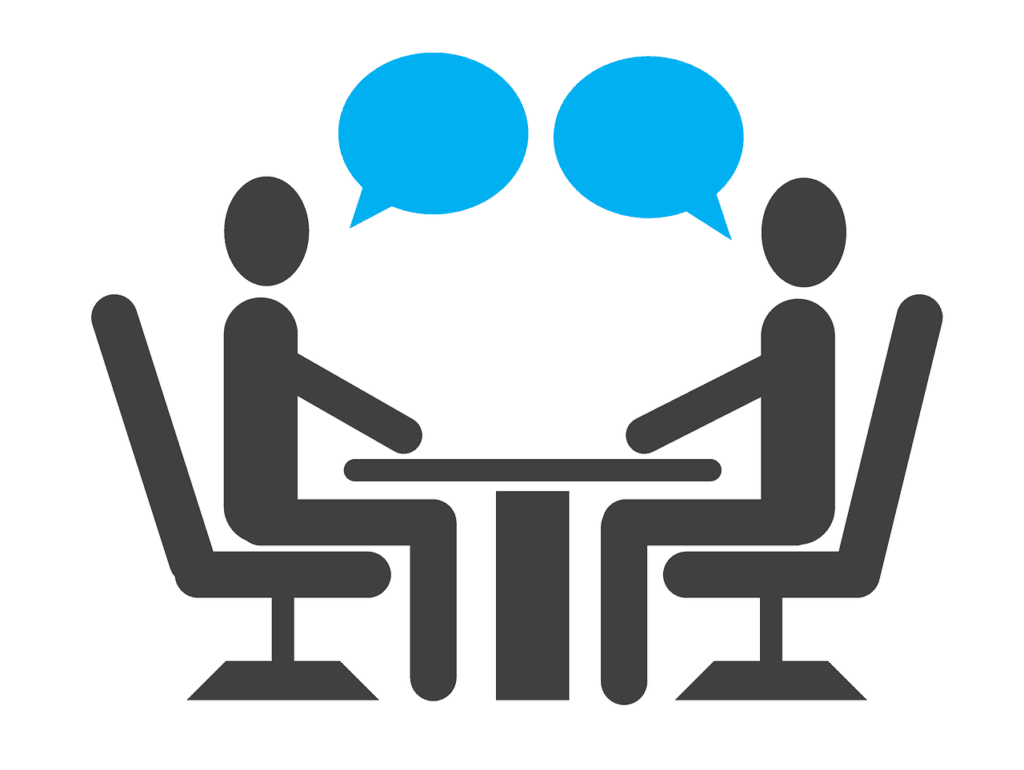
Find Shared Goals and Values
Discovering shared goals and values is another effective way to build rapport. When you align with someone on what matters most to you, it creates a sense of unity and understanding. Explore common aspirations, whether personal or professional, and discuss how you can support each other in achieving them. Building rapport based on shared goals and values fosters collaboration and strengthens the connection.
Offer Support and Help
One powerful way to build rapport is by offering support and help to others. Actively listen to their challenges and offer assistance whenever possible. Share your knowledge, skills, or resources to make a positive impact in their lives. By demonstrating your willingness to help, you show that you genuinely care about their success, which strengthens the bond and builds trust.
Collaborate on Projects
Engaging in collaborative projects helps build rapport naturally. By working together towards a common goal, you create opportunities for teamwork, problem-solving, and mutual understanding. Collaborative projects encourage open communication, idea-sharing, and active participation. As you contribute to the project’s success, it strengthens the rapport and establishes a foundation for continued collaboration.
Practice Empathy and Active Support
Building rapport requires practicing empathy and actively supporting others. Put yourself in their shoes and genuinely try to understand their experiences and emotions. Offer a listening ear, provide encouragement, and validate their feelings. Actively supporting others shows that you’re invested in their well-being, and it fosters deeper understanding and trust.
Celebrate Success Together
When someone achieves a milestone or reaches a goal, celebrate their success together. Acknowledge their accomplishments, express genuine happiness, and offer congratulations. By sharing in their joy, you strengthen the rapport and build a positive connection. Taking the time to recognize and celebrate each other’s achievements shows that you value and support one another’s growth.
Practice Open and Honest Communication
Open and honest communication is crucial for building rapport. Be transparent and genuine in your conversations, expressing your thoughts, ideas, and concerns openly. Encourage others to share their perspectives as well. By fostering an environment where everyone feels comfortable speaking their minds, you enhance trust, deepen connections, and promote constructive dialogue.
Conclusion
Building rapport is an essential skill in any personal or professional setting. By asking the right questions and showing genuine interest, you can establish trust, foster connection, and create a positive environment. Remember to be genuine, ask open-ended questions, and show active listening. By following these tips and using the examples provided, you’ll be well on your way to building strong rapport and establishing meaningful relationships.
Key Takeaways:
- Building rapport is crucial for establishing trust and fostering connection.
- Tips for building rapport at work include being genuine, asking open-ended questions, showing active listening, finding common ground, and being empathetic.
- Examples of effective rapport-building questions include asking about career motivations, stress management, proud accomplishments, workplace enjoyment, and problem-solving approaches.

